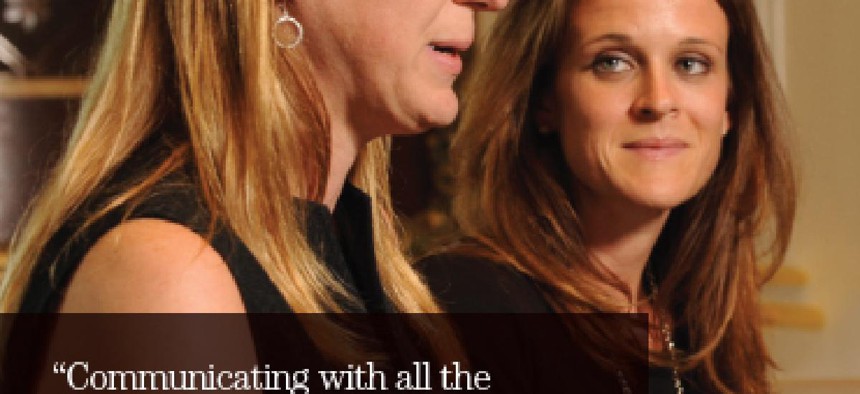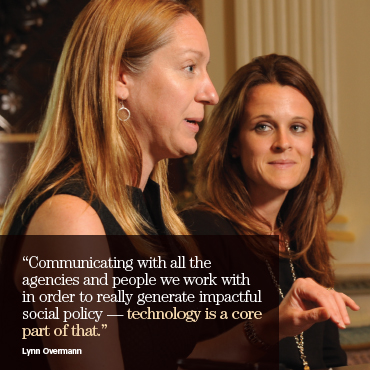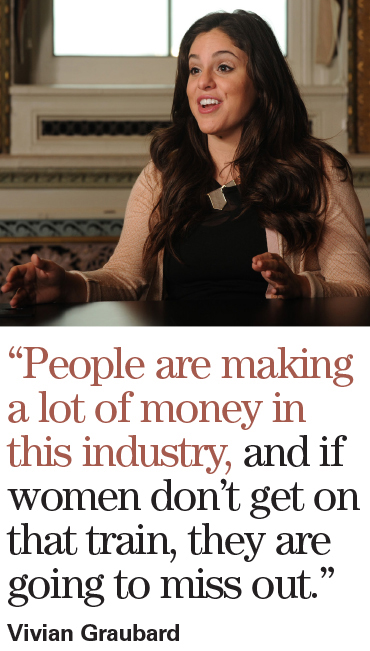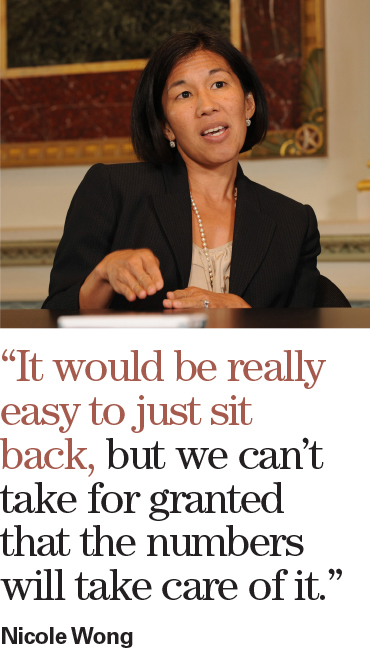The women behind OSTP

Five years ago, the office of the chief technology officer was effectively a boys' club. But times have changed.

Lynn Overmann, left, with Danielle Carnival. Photo by Stan Barouh.
It took a cup of coffee and an offhand comment to start a movement at the White House's Office of Science and Technology Policy.
When U.S. Chief Technology Officer Todd Park came to OSTP in March 2012, he inherited an office with no women. That May, Park hired Vivian Graubard as his special assistant. Graubard, an IT graduate from American University, said it was tough to be the only woman in the office.
"When you think about work environments, when there's a team that's all male -- advisers, senior advisers and deputy CTOs -- and then have the only woman in the office, coincidentally, be the assistant...it didn't make for a very diverse or comfortable work environment," Graubard said.
When she commented about it to Park over coffee, he promised he would make it better and immediately took action.
"The women started raining down on our office," Graubard said.
In the next year and a half, Park hired women almost exclusively, bringing in Code for America founder Jennifer Pahlka and Twitter lawyer Nicole Wong, along with Lynn Overmann, Colleen Chien, Claudia Williams, Corinna Zarek and Erie Meyer as senior advisers.
"If there was one person in his office who didn't feel comfortable going into work every day, then that was [too many]," Graubard said. "He made it his personal mission to make sure that changed."
Now, the CTO's office boasts lawyers, technologists, CEOs and entrepreneurs -- and a healthy share of women leaders.
The women who make OSTP tick
The women at OSTP prove that no two government employees, especially government IT employees, are alike.
Wong came to the office last June from Twitter, where she was director of legal products. Before Twitter, she spent eight years as vice president and deputy general counsel at Google.
Apart from working at two of the world's tech giants, Wong jokes that her background is all over the place. She's a lawyer with a bachelor's degree in American studies, a minor in English, a fellowship in poetry and a master's degree in journalism.
"What that means is there's a huge need for people outside of the core technologies to get involved because technology is touching all of our lives," Wong said. "Regardless of what your discipline was when you came into college or came out of college, I think you want people who have a diverse background of experience to be touching, understanding and influencing technology."
Overmann also has a law background -- another field that is often dominated by men. She worked as a lawyer and a public defender for many years and joined the Justice Department as a senior policy adviser to the assistant attorney general in 2009.
After serving in several roles at Justice, she came to the White House as a policy specialist in the Office of the Vice President in 2012, then moved to OSTP in 2013 as a senior adviser to the CTO.
Much of her job involves communicating with the criminal justice and legal communities about how they can better use technology. Overmann said leaders often don't understand how technology can be integrated into the policymaking process, so she helps spread that message.
"Communicating with the criminal justice community ... and communicating with all the agencies and people we work with in order to really generate impactful social policy -- technology is a core part of that," Overmann said. "And that has not been part of the conversation for long, [so] it's something they're not familiar with."
And that's where Overmann said Park has been particularly effective in deploying his team -- by sending them out to eliminate the fear of technology.
Graubard's background, on the other hand, is rooted in technology. Furthermore, as a first-generation American, the only woman in the first IT class she took in college and then the only woman in the CTO's office, she is used to being a trailblazer.
Considering the challenges and problems that OSTP deals with on a daily basis, building a team with a diverse set of skills was a no-brainer. Whether it's dealing with climate change, open-Internet policy, the human brain or cybersecurity, OSTP staffers must be equipped to deal with a variety of situations and stakeholders.
Graubard, who was promoted to an advisor role in 2013, was part of the OSTP team that recently explored how technology can help victims of sexual assault on college campuses.
"I [attended] American University, my background is IT and international business," Graubard said. "I never thought at some point in my career that I would be talking to victims of rape and sexual assault about what technology could do to help them."
'Women love hard problems'
In recent years, the push to get more women to pursue careers in technology fields has gained momentum. Advocates like Yahoo CEO Marissa Mayer, support groups like Tech LadyMafia and Women in Technology, and national policy efforts aimed at achieving gender equality in those fields are starting to bear fruit.
However, Danielle Carnival, a senior OSTP policy adviser and neuroscientist, said women should be motivated by more than pay and job security. There's also the fun factor of working in science and technology fields.
"I spent five years learning as much as I could about how the brain works," Carnival said. "That's a cool job. I want more girls to be able to grow up and say 'I want to do that.'"
Meyer, another senior adviser to Park, is an active advocate in the women's technology community. About three years ago, she and friend Aminatou Sow co-founded Tech LadyMafia, a listserv supporting women who work in technology-related fields.
Based on her experience inside and outside the White House, she said women are embracing technology. "Women really want to work in tech," Meyer said. "They love it. They love it because they love hard problems that are being solved for the American people."
So why, then, do the numbers often tell a different story?
According to the National Science Foundation, women earned 18.4 percent of engineering degrees and 43.1 percent of mathematics and statistics degrees in 2010. However, that progress seems to be slipping with regard to computer science: Women received 29.6 percent of bachelor's degrees in computer science in 1991, compared to 18.2 percent in 2010.

The women of OSTP are serious about seeing those numbers change.
"People are making a lot of money in this industry, and if women don't get on that train, they are going to miss out," Graubard said. "There's going to be a major wealth gap generated, and that is something I think about a lot as a Hispanic, first-generation American woman."
She is also perturbed by the lack of visibility given to successful women and minorities in the industry, especially those at big tech companies. "Where are all the women we're hearing about -- the women who are entrepreneurs, whose companies are IPOing for millions of dollars?" she asked.
Say goodbye to 'bro' culture
According to Wong, Silicon Valley's "bro" culture is finally drawing attention as diversity data starts to reveal the inner workings of the tech titans on the West Coast.
In May, Google revealed that women make up only 17 percent of its technology staff. At GitHub, 6.25 percent of engineers are women.
"They need to own the problem. We all need to own the problem," said Wong, who left OSTP on Aug. 15 to return to California. "Men need to advocate and mentor as much as women do. We need to start putting it on the rest of our colleagues in this field."
The Obama administration and especially OSTP have been striving to engage more students in science, technology, engineering and mathematics (STEM) and level the playing field for women.
The 2014 Working Families Summit brought awareness to those issues. But Carnival said the government can really make an impact by investing in those areas. For example, initiatives at NSF and the National Institutes of Health support research across the country on women and minorities in the workplace.
The neuroscientist side of Carnival emerges as she explains the amount of work left to be done while relishing the challenge.
"The fun part about our job and about science and technology is not learning and repeating what someone else discovered but going through the scientific process yourself and finding something new," she said.
'I don't shine if you don't shine'
Despite their different paths to the White House, the women at OSTP are similar in one respect: None of them expected it to be easy.

"I never grew up feeling as though I couldn't do something," Overmann said, "but I did grow up feeling like it was going to be harder for me to do different things."
Yet something about this group of problem-solvers suggests that they wouldn't have been happy if it did come easy. That's why they all eagerly look forward to a future where women lead the way in STEM fields.
Still, Wong said, flooding the pipeline and hoping for the best isn't a sufficient strategy to get more women into those fields.
"I think we need to keep in mind it's a fight every day," Wong said. "It would be really easy to just sit back, but we can't take for granted that the numbers will take care of it. We have to build communities, and we have to work at creating equity."
Most of those communities arise from strong mentor relationships. In fact, Wong had to cut short her interview with FCW to head to a technology mentorship event.
In a city where there is such emphasis on career status, the women at OSTP seem to disregard the competitiveness that would tear some offices apart and keep co-workers from becoming friends.
Meyer said she sees the shine theory -- "I don't shine if you don't shine" -- in action at OSTP.
"Why I love working at OSTP is because it's a strong community of women who look for those sorts of opportunities -- not just to increase the female representation, but to also make sure we have minorities and different perspectives represented," she added.
The onetime boys' club culture of OSTP has all but disappeared. The women on the team pride themselves on lifting each other up. And with Park stepping down as CTO to focus on recruiting more top Silicon Valley talent into government, it appears there will both growing pressure and growing opportunity to continue doing so.
"It's been my experience in both the private sector and public sector that teams that are diverse outperform teams that aren't," Park told FCW. "The dedicated women of OSTP are some of the most extraordinary people with whom I've ever worked, and I feel incredibly fortunate that they are my teammates."
Note: This story was updated on Aug. 27 to clarify that Graubard was the originally the only women in the office of the chief technology officer, not in all of OSTP.
NEXT STORY: FCC taps Scott Jordan for CTO role



